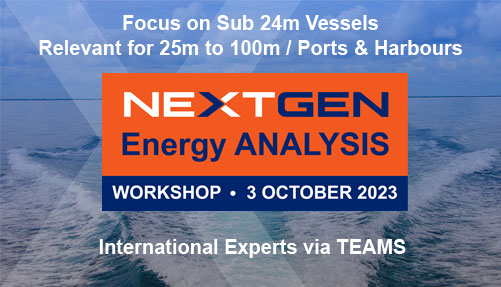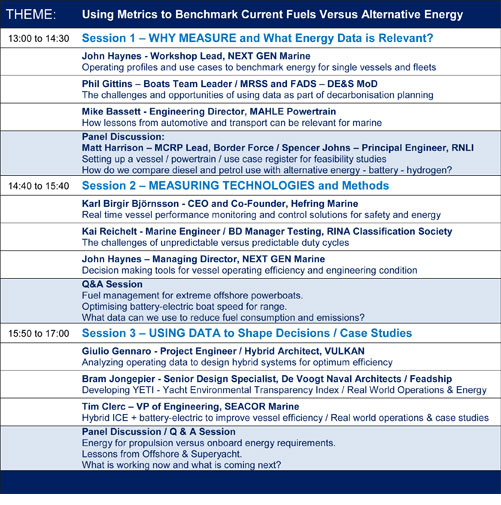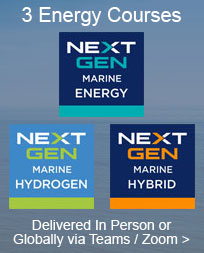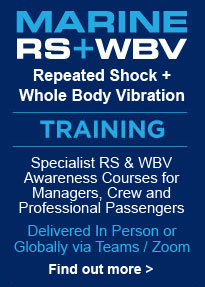
Workshop Lead – John Haynes
From running Energy Transition training for significant maritime organisations it is clear there is a need to measure current fuel use and compare alternatives.
The aim now is to establish which analysis methods are viable - plus how real world duty cycles and use cases fit with different forms of energy data.
This is the first edition of NEXT GEN Energy ANALYSIS. Thanks to all the Presenters and Supporters who made this a lively and informative workshop.

Feedback from Attendees
I find these workshops very valuable and particularly with the subject of Future propulsion and fuels it is good to see that we are sharing the same challenges with many others, which also provides the opportunity to work together on potential solutions. It also provides a good insight into what others doing and developing which isn’t always easy to come by independently without these events. The relaxed nature of these events allows for more opportunities to approach collaborative working and certainly provides more contacts to enable more partnerships to be explored.
Spencer Johns – Principal Engineer, RNLI
An excellent mix of presentations made this a very informative workshop. The structured, but informal, way John Haynes leads the discussion enables participants to feel at ease and provides a platform for a very open discussion. This was a very well organised workshop which was attended by key industry players and provided an excellent platform for technical discussions regarding the challenges facing operators within this sector.
Mike Bassett – Engineering Director, MAHLE Powertrain
I found the first ‘Why’ and ‘What’ energy analysis discussion to be most useful, especially as it discussed and presented from the point of view of similar non-standard or predictable duty cycle operators, such as RNLI and MOD, how relevant data may be collected and analysed. The further presentations on challenges relating to these areas, the hybrid presentation and all associated panel discussions were also very interesting.
Chris Mace – BFMC Commander, Border Force
Thanks, another great workshop! I initially wondered if this workshop would be relevant to me/Sunseeker, but it definitely was and I learnt so much. The presenters are very knowledgeable and always willing to share their experience, expertise, knowledge, etc.
I look forward to the next one.
Sean Dempsey – Sustainability & Environmental Manager, Sunseeker
It was good to see that there are people about that are producing products, instead of just theoretical discussions. The workshop was very interesting.
Mark Boulton – Principal Engineer, RNLI
A very informative session with insightful comment from industry experts. The format worked very well. Wonderful to see the marine industry coming together to share knowledge and experience to drive improvements in energy consumption across such a wide range of sectors.
Simon Barnett – Sales Manager, Proteum / OXE Marine
A great workshop with some excellent presentations and discussions.
Capt Don Cockrill – Former Secretary General, UK Maritime Pilots Association
The NEXT GEN Energy ANALYSIS Workshop successfully presented a dense, truly cross sector, candid, view of energy and infrastructure needs for boats in all sectors and associated port and harbour infrastructure challenges.
Matt Candy – CEO, Steamology
Another great workshop hosted by John and the NEXT GEN team. As always a great mix of presenters made for a really informative session with loads of ideas and experiences being shared.
Roger Cerrato – Sales Director, Landau
A very good workshop to get a view of what the larger organisations are working on and the challenges they face - very helpful for smaller companies like us to understand where the future is likely to go with powertrain.
Simon Mcloughlin – Managing Director, C-Fury
I found the workshop really interesting and full of high technical contents. It was a great pleasure to be part of it.
Giulio Gennaro – Hybrid Team Project Engineer, VULKAN
This was a well-presented workshop with a good mix of relevant presenters covering a range of complimentary subjects. John controls the discussions very well and ensures that an open, collaborative approach is followed. Thanks again for inviting MAHLE Powertrain to participate.
Daren Mottershead – Sales & Marketing Manager, MAHLE Powertrain
A fascinating insight into how problematic a process moving from diesel powered propulsion is proving to be. One appreciated just how open the speakers were about their progress within their fields. Excellent - thank you.
Spencer Barnaby – Maritime Volunteer Service
A well constructed event which worked very effectively in the form of an interactive workshop. All subject matter was informative and well balanced in addressing the scope of problems associated with marine de-carbonisation, current analysis methodology and those potential solutions that are in operation. My thanks go out to John, Claire and the enthusiastic delivery provided by the presenters.
Peter Foot – Managing Director, Pallington Foot
To find out about future NEXT GEN Workshops:
info@shockmitigation.com
Supporters

Relevant to Professional - Commercial - Military:
End-user Organisations // Operators // Boat Builders
Equipment Manufacturers // Naval Architects // Engineers
Ports & Harbours // Maritime Legislators // Classification // Academia
Marine Energy Analysis for:
Work Boats // Patrol Craft // Military // Search & Rescue
Wind Farm Support // Pilot Boats // Offshore // Police & Security
Training & Charter Vessels // Superyacht & Tenders

MAHLE Powertrain (MPT) is a leading engineering consultancy focussing on complete powertrain development. Providing support across a range of industries, MPT’s expertise covers system engineering of ICE with traditional and alternative fuels, such as eFuels, hydrogen, ammonia and electrified solutions including hydrogen fuel cell and high-performance batteries. MPT is currently leading the HyJet consortium with partners including University of Nottingham, Clean Air Power and the RNLI to develop sustainable propulsion solutions for retrofit to high-performance marine vessels.
www.mahle-powertrain.com

Ship classification has been at the core of the RINA business since its inception in 1861. RINA integrated services for the complete shipping cycle include design, building, shipyard management, inspection and testing of materials / components. Surveys to maintain the class are used by merchant ships, ferries, ro-ro, yachts, cruise ships, naval vessels and offshore vessels. RINA is authorized to carry out surveys onboard by 116 international flag authorities. RINA is involved in new propulsion systems including Hydrogen, Methanol and Wind-Assisted Ship Propulsion (WASP).
www.rina.org

Hefring Marine has developed the Intelligent Marine Assistance System (IMAS) which is an on-board digital assistant and fleet management solution. IMAS Helm tackles two of the largest cost and risk drivers of fleet operations - accidents and fuel consumption. The solution is an on-board Artificial Intelligence that saves fuel, reduces carbon emission and improves safety with real time onboard sea navigation that continuously improves as the system learns. The onshore cloud platform, the IMAS Console, is a vessel fleet management and analytics solution.
www.hefringmarine.com

VULKAN Group is a technology and market leader in the field of marine, industrial and energy technology. As part of maritime energy transition VULKAN Hybrid Architect: Responds to owner requirements, understands the needs of the shipyard, analyzes the project, designs and proposes a solution, co-ordinates projects from start to finish, provides hybrid components for the entire system. VULKAN Hybrid Architect projects include Mega Yachts, Passenger Vessels, Pilot Boats, Windfarm Vessels and Workboats.
www.vulkan.com
VESSEL Duty Cycles & Energy Density
Commercial vessel operators can learn from other sectors. Bus duty cycles may be similar to ferries. Construction equipment has high daily usage and extreme duty cycles that may be similar to aspects of military or search & rescue. Aviation has an even higher demand for reliability than marine. Analysis of many vehicles and vessels highlights that due to energy demands, a boat is nothing like a floating automobile.
Even as batteries evolve they will still have significantly less energy density than petrol or diesel. To achieve similar ranges to current vehicles, automotive manufacturers have recognised the need for hybrid technologies. As marine propulsion has high energy demands it will require hybrid systems, utilising high performance batteries combined with an internal combustion engine and clean fuels or fuel cells, to provide range.
Besides the drive for reduced emissions, as fuel prices increase many organisations are having to adapt to a level of fuel costs they have never experienced before. This will also drive the market to create alternatives. Before a commercial operator can re-power their vessel it is essential to identify whether fuel will be available onshore and how much more it will cost compared to diesel or petrol.
MARITIME Energy Transition TIMELINE
In 2021 the COP26 conference highlighted effects of global warming and pushed for faster emission reductions across all energy sectors. With the shipping industry responsible for over 75% of global trade, pressure is accelerating for ships to reduce emissions.
In the UK the effects of the Clean Maritime Plan and Maritime 2050 will filter down from large ships to small commercial vessels. In 2023 and 2024 Dept for Transport consultations, modelling, research & development and technology demonstrations aim to identify what is possible.
By 2025 pressure will increase on UK and EU commercial and government vessels to deliver a plan for change. By 2030 there will be a high expectation for all professional operators to have made significant changes, subject to technology readiness onboard and infrastructure onshore.
Reduced emissions compliance will be required for both new builds and in service vessels via re-powering. To enable energy transition, all stakeholders need to understand how much energy they are consuming now and make comparisons with alternative fuels and new energy technologies.











